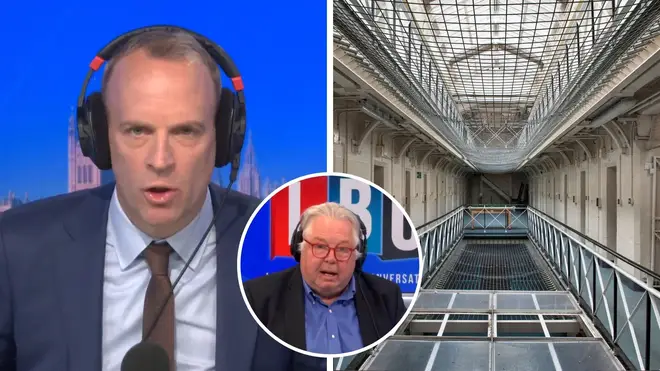
Shelagh Fogarty 1pm - 4pm
27 April 2022, 00:36 | Updated: 27 April 2022, 09:00

Terrorists in jail will be separated from other inmates to stop them radicalising prisoners.
Dominic Raab announced the crackdown after a damning prison report discovered extremists behind bars have been using Sharia courts to deliver punishments such as flogging.
A team will be set up to identify 'influential and charismatic terrorists' before moving them to one of three separation centres to stop radicalisation occurring.
Speaking on LBC's Nick Ferrari at Breakfast, Justice Secretary Mr Raab said the increased number of terrorist convictions was behind the problem.
He told Nick: "We must not allow religious or cultural sensitivities - as important as they are - to deter us from clamping down and nipping in the bud early the precursor signs of radicalisation.
"That can be things like the step from eating halal, which of course we want to respect, to requiring others in their wings or kitchens to follow Sharia rules.
"That clearly is points along the spectrum but that must be stopped and we're going to give prison governors greater authority to do that."
Read more: Staring can land you in prison as police crackdown on 'unhealthy sexual behaviour'
Read more: Plans to 'tear up' NI Protocol to be included in Queen’s Speech

Justice Secretary reacts to growth of terrorism in prisons
The Deputy Prime Minister went on to say: "I don't want any racism or anti-Islam behaviour inside prisons but our prison officers do the most incredible job.
He added: "I will stand full square behind them but more than that - because warm words are not enough - we're providing them money, so we can target the real troublemakers, we have the facilities - we've got 28 separation centre places and we're only using nine at the moment.
"And we'll provide the legal protection through the 'bill of rights', which will replace the Human Rights [Act], which through its elastic interpretations has allowed people that present an extremist or terrorist threat being able to claim a right to socialise within the prison estate."

Raab: Human Rights Act has made it easier to radicalise behing bars
The team that assesses terrorists will cost £1.2 million and a further £6 million will be invested into 'close supervision centres' so they can hold not just the most physically violent prisoners, but terrorists as well.
The Government's new 'bill of rights' will also weaken prisoners' ability to bring claims against their treatment under the Human Rights Act, including for religious and cultural reasons.
It comes after the initial review found radicalised inmates used their "celebrity" status to try to take over prison wings and made "insincere allegations of racism and Islamophobia" when challenged by staff.
Jonathan Hall QC, the Government's independent reviewer of terrorism legislation, said: "For the last decade and a half, groups of prisoners . . . have adopted an anti-state Islamist stance that condones or encourages violence towards non-Muslim prisoners, prison officers and the general public."

The top counter terror cop talks about terrorists being released from prison
It will also be more difficult for prisoners to legally challenge their transportation to a separation centre.
In line with Mr Hall's recommendations, Mr Raab said the process for referring prisoners to the separation centres will be strengthened against legal challenge to ensure they cannot frustrate a move on "trivial grounds".
Only nine terrorists including Hashem Abedi, the Manchester Arena bomb plotter, are held in the separation centres in England and Wales, despite 28 cells being available.
Last year the Counter-Terrorism and Sentencing Act introduced a 14-year minimum jail for those convicted of a 'Serious Terrorism Offence'.
Read more: Video shows Putin 'uncontrollably convulsing' during meeting with Lukashenko
The Act also widened the range of offences classed as terror-connected and increased maximum penalties for certain terrorism offences.

Ex-counter-terrorism chief 'not particularly' surprised Britain's youngest terrorist can be freed
A specialist training programme has also equipped 15,500 frontline prison officers to identify and challenge terrorist behaviour.
Separation Centres and Close Supervision Centres are limiting the interactions of terrorist offenders and stringent monitoring of communications has been introduced to intercept further intelligence, networks and plotting.
It follows a series of high-profile cases, including the 2019 London Bridge attack when Usman Khan, a terrorist prisoner out on licence, stabbed two people to death.
In 2020 Brusthom Ziamani, who was serving a 19-year sentence for plotting to behead a soldier, was convicted of attempted murder for trying to hack an officer to death in the maximum-security Whitemoor jail.
Khairi Saadallah, who was given a whole life sentence last year for murdering three men in a terror attack in a Reading park, had been befriended by a radical preacher while serving an earlier prison term.
Since 2017, 32 terrorist plots have been uncovered and intercepted by MI5 and Counter Terrorism Policing, and over 200 prisoners convicted of terrorism offences can be found in British jails at any one time.
But the UK's terror threat level remains 'substantial' following attacks in Fishmongers' Hall, Streatham, Reading and the first attack inside a British prison at HMP Whitemoor in 2020.